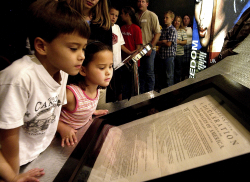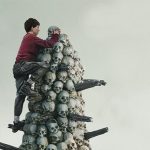The Tin Angel is a new opera by Daniel Asia, the American composer born in 1953. It is based on a novel of the same name by Paul Pines (1941–2018). Pines wrote the libretto. The opera will be premiered in New York at the end of this month. For information, go here. And now, a Q&A with the composer.
Jay Nordlinger: Have you ever written an opera before?
Daniel Asia: No, this is my first opera—but I have written many song-cycles and songs; other works involving voice; works for chorus; etc.
JN: Was it enjoyable to write an opera? Does it relate to songwriting? Symphonic writing? Both? Chamber, too?
DA: The adjective “enjoyable” is not quite right. All composers have to work at writing their music. Beethoven and Stravinsky certainly did. I do too. The work, the process, is deeply meaningful. When you are in the flow, which is to say, connected to the world of musical ideas, you are in one of the best states of being the universe has to offer.
I would reserve “enjoyable” for a good cup of cappuccino or the like.
What I can say is that once I started writing the opera, I just couldn’t stop. Remember, I had never written one of the dang things. What if it didn’t flow, or worse, just wouldn’t happen? But it did! I was delighted and overwhelmed.
Songwriting is usually done by a composer and lyricist. (Sometimes they are one and the same, Irving Berlin being a prime example.) I worked with a libretto created by my collaborator, Paul Pines. He wrote the novel on which the opera is based. When I told him I wanted to write an opera and asked whether he would work with me, he said, “Sure.” He then suggested that The Tin Angel would make a great opera. I agreed, and we were off.
By the way, Paul was working on The Tin Angel when we first met at the MacDowell Colony, years before.
He went through nine drafts of the libretto, and we worked together on the tenth. The libretto is tight as a drum, which made composing the score easier than I might have expected.
Writing an opera is similar to writing symphonic music in two essential ways. If you are writing for a full orchestra, you need to know your way around that beast. Having written symphonies and other works for orchestra certainly helped me in this regard. Writing a symphony also requires thinking about extended time frames and thus pacing. This, too, is necessary for opera.
Opera often requires the intimacy of chamber music, so having written a good bit of this didn’t hurt either. Perhaps the paradigm I have in mind is Mozart. He covered all genres, and each, I suspect, had an impact on the others.
JN: Is it easier to write music with words than to write “abstract” music? Music that doesn’t “mean anything”? Do you “tell a story” even when you write music without words?
DA: I find it a bit easier to write music with words than “abstract” music. Words provide form and directionality. The composer provides the “reading” for the text, an interpretation that is only one of various possibilities. The composer might give a different interpretation of the same text in another musical setting.
The greatest poetry can suggest numerous interpretations, all equally valid and rich, and the same is true of “abstract” music. Performers view this music differently as it journeys through time.
JN: What is The Tin Angel about?
DA: Briefly put, it’s a murder mystery set in a New York jazz club during the recession of the 1970s. (More specifically, the club is in the Bowery.)
I would say, The Tin Angel is a grand opera in the tradition of Aaron Copland, Samuel Barber, Carlisle Floyd, John Corigliano—American composers who incorporated popular songs and jazz styles into serious works with an unmistakably American flavor.
JN: Tell us a little more about the novelist and librettist, Paul Pines.
DA: As with all great writing, his has its own voice. He is a New York City Jewish poet, swinging from Ecclesiastes to the blues, from Telemachus to Bernstein to the jazz scene, grounded in a sweeping knowledge of the world’s religions and myth structures. His writing is down-to-earth, pithy, direct, and haunting. He examines the beauty of the world, and our being in it, in exquisite poetry and prose. The Tin Angel, as novel and libretto, contains his range of qualities.
JN: Have you written music in just about every genre? Is there any genre left?
DA: I have indeed written music in all genres: solos, duos, trios, quartets, sonatas, symphonies, choruses, and even electro-acoustic music. Each genre is another wonderful sphere of new musical possibilities!
JN: Is opera still an art form with juice? Will opera speak to people, interest people, in every age (as it has done since Monteverdi or so)?
DA: A decade or two ago, Charles Murray asked whether certain art forms had already been “filled” and were therefore no longer viable. For example, as conceptual, minimalist, and pop art took over in the 1960s, one might have thought that the “bucket” of representational art had been filled, not allowing for a drop more. But then came photo-realism, followed by post-modernism, and lo and behold, a head-on return to (a form of) representational painting.
What is opera? Might it be said that it is music with words, and that those words may or may not tell a story? (The Magic Flute does, Einstein on the Beach does not.) That it involves people who both sing and act? That it makes use of sets, lighting, and costumes? That it might include dance? That it takes a while (except for minute operas!), adding up to something bigger than each of its parts? (We can except the “operas” of John Cage.)
Stories, music, and dance have always been with us. To combine them made perfect sense. Opera, in some shape or form, will be with us forever.
JN: What made you want to be a composer in the first place? Or did composition choose you?
DA: I started playing the trombone at age nine, the guitar at thirteen, the recorder family at seventeen, and finally the piano in college (I should have listened to my mother and started much earlier). I began conducting in high school thanks to having to wear braces on my teeth—hard to play the trombone with those. Then, two years of college theory at the end of high school, and all those notes proved interesting.
After high school, I almost went on the road with a Blood, Sweat & Tears rip-off band. Instead, I went to college and tried not to do music. That lasted all of a month. I couldn’t resist writing the music I wanted to hear but that hadn’t been written yet. I guess you could say music chose me.
Being a composer is tough unless it is the only thing you can imagine being. If it is that, it makes life worth living and gives it its fullest meaning. Bringing musical beauty into the world has been my task. What a blessed life I have had.

















